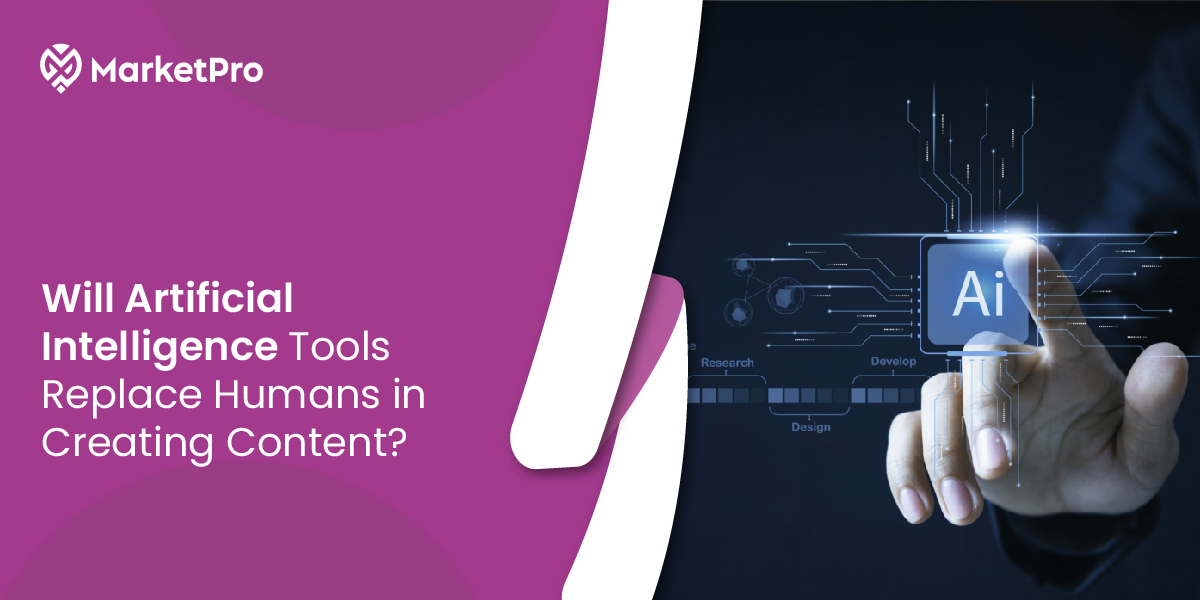In the world of digital content creation, one cannot help but wonder: Will AI content writers eventually replace writers? It is a valid concern in the B2B world as companies try to streamline their content creation processes and find ways to utilize today’s technology. In this article, we’ll shed light on what artificial intelligence tools are used in B2B content creation, examine their strengths and weaknesses, and speculate about what it is likely to imply for content writers.
This blog will discuss what artificial intelligence tools are used for in B2B content writing, their pros and cons, and reflect on what that future is likely to hold for content creators.
The Emergence of AI Tools
AI/ChatGPT has completely changed content creation. The tools powering AI have come so far in just the past few years — and they’ve really started to come out with great stuff. Apart from this, such platforms employ extremely advanced NLP algorithms, smart modules, and massive data repositories to generate text that looks almost like a human’s content.
According to the data, there is an increasing demand for AI-based content generation tools. In a report, 64% of B2B marketers claimed that using AI helps them in their sales and marketing strategy. That means that companies are beginning to see AI as a means of automating their content creation, making it cheaper at scale.
Efficiency
The content creation market is evolving with the use of AI-based tools as now companies can generate tons of textual content (blogs/articles and lots more) in no time. These tools have dramatically helped with this demand and have allowed companies to remain relevant. Additionally, tools based on AI are emerging as a critical resource to be leveraged for content distribution services, SEO content, and content marketing services.
Consistency
It’s important for businesses to be consistent in their brand identity. AI content writer will maintain the same tone and writing style for you throughout all posts — consistent with your branding. This creates an identity for your brand and engenders brand loyalty, ensuring every email or social media post has the same voice. Furthermore, as it negates the chances of human error or deviation from tone, artificial intelligence technology ensures brand consistency. This ensures that your brand’s own brand identity can be maintained, which helps to engage with your customer base and hold your ground in the market.
Data Analysis
AI’s capacity to analyze large data sets allows for extracting important insights such as trends, key phrases, or words of choice. This data can be used by businesses to generate content that is tailored to their target audience’s needs and wants. Companies now possess an opportunity to harness AI’s analytics skills to create compelling content that resonates with the consumer. It gives a peek into what the consumers will be interested in and thus lets the businesses develop the content as per their interests which would ensure that they keep on staying hooked.

The Capabilities of Artificial Intelligence Tools
Artificial intelligence tools excel in several areas that make them valuable assets in content creation:
Personalization
With B2B marketing, AI can take the content and tailor it to an individual user’s interests so it feels more personable. The more you interact with something, the more data the system gathers about you: what you engage with, how you engage with it, what you’ve clicked on, etc. This is used by the system’s algorithms to make personalized assessments of what customers want. This level of personalization increases engagement and conversion rates. It cultivates deeper relationships, builds trust, and generates more impactful B2B marketing campaigns in which each experience feels personally crafted for the recipient’s unique wants and needs.
Multilingual Content
AI solutions are smashing linguistic borders and guiding companies abroad faster than ever. By this method, businesses can easily turn their content into multiple languages, getting through to new markets and communities internationally. It guarantees your brand’s message stays consistent and strong across borders with this inbuilt multi-language flexibility, allowing you to connect with diverse customers on a meaningful level.
Suggested Read: How to Boost SEO For SaaS in 2023 with Content Marketing
It’s like having a universal translator at your disposal, broadening your reach and enabling you to tap into the vast potential of the global market. With AI’s linguistic prowess, businesses can expand their horizons and embark on a journey towards international success.
The Limitations of Artificial Intelligence Tools
While artificial intelligence tools offer impressive capabilities, they are not without their limitations:
Lack of Creativity
AI/ChatGPT lacks creativity and cannot generate original or groundbreaking content. It utilizes available data to produce exceptional or innovative content, which can limit its ability.
Emotion and Empathy
AI cannot genuinely understand emotions or empathize with the audience, making it challenging to create emotionally resonant content.
Quality Control
While AI can generate content fastly, the quality of content it produces is not always the best. Human oversight and editing are often necessary to ensure accuracy and coherence.
Complex Topics
AI may struggle with complex or highly specialized topics that require in-depth expertise and nuanced understanding.
Ethical Concerns
Artificial intelligence writing presents an ethical dilemma of truth, fairness and plagiarism. Companies must tread this ground carefully.
Future of AI in Content Creation
As technologies progress, AI tools probably won’t replace human writing completely. Rather, they are likely to support human content creation endeavors. Content creation does not have room for a human replacement for the unique qualities of creativity, critical thinking, and empathy that writers offer. Writers can use AI to locate research ideas, generate data-backed insights, automate routine tasks, and more, giving them more time to explore the creative and strategic sides of writing.
The B2B Perspective
The usage of these AI tools in content development is critical in the B2B space. B2B content is frequently technical. It necessitates specialist industry expertise as well as an understanding of target consumers’ behaviors and interests. While AI can assist in the generation of data-driven reports, product narratives, and technical material, it may struggle to capture the complexities and context required for B2B communication.
Suggested Reads: Why You Should Outsource Technical, B2B, and SEO Content Writing Services?
Companies must strike a balance between adopting AI for efficiency and maintaining the quality and authenticity of their material. This means investing in both AI-powered tools and human expertise. We don’t have to decide between them; what we need is to use both their strengths to do better than before.
Integration of AI in Content Marketing
While algorithms have come a very long way in creating content, they can rarely match the imagination or empathy and the knowledge base that a human writer offers. Instead of seeing AI as a foe, companies should see it as an asset to improve on content production methods. AI and human collaboration are the future of content creation, producing high-quality, engaging, and meaningful content. And an agency like Market Pro can do that best.
We leverage AI for research, data analysis, and automation while our real human writers contribute their imagination, expertise, and the human touch. As the B2B content industry continues to see change, those who use the right blend of artificial intelligence and creative thought to produce content that connects with their ideal audience, garners engagement, and ultimately hits their business objectives will have a leg up in the game. Whether or not AI will write the content of the future is not simply a question of yes versus no; instead, it is one of synergy between technology and human ingenuity.

